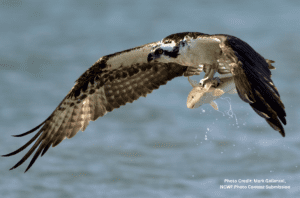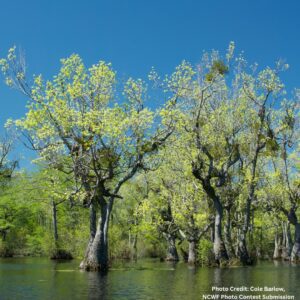Wetlands that shelter wildlife and protect communities are at risk, but NCWF and other conservation groups are standing up for wetlands protections.

Attorneys for the North Carolina Wildlife Federation and National Wildlife Federation have just filed a motion in the U.S. District Court for the Eastern District of North Carolina to intervene in a case that seeks to virtually eliminate wetlands’ federal protections, which were drastically narrowed by the U.S. Supreme Court’s 2023 decision in
Sackett v. EPA.
In this case, White v. EPA, a landowner is challenging the federal government’s definition of protected wetlands and advancing an interpretation that would write most wetlands out of the Clean Water Act—a move that could deprive the families, outdoor enthusiasts (including hunters and anglers), and communities who use and rely on wetlands the benefits of federal clean water protections.
“A ruling adopting this extreme view could have devastating effects on waters in North Carolina and throughout the nation,” said Mark Sabath, senior attorney at the Southern Environmental Law Center. “Wetlands are vital to help protect drinking water supplies, wildlife and fisheries, and our communities from flooding. If the wetlands along our coastal waters like the Albemarle Sound are developed and destroyed, communities will be wrecked by job loss, wildlife loss, and flooding.”
Wetlands Protections are critical in Connecting People to Nature

Photo Credit: Cheryl Williams, NCWF Photo Contest Submission
Healthy fish and wildlife depend on clean water. These valuable waterways that are threatened by the industry lawsuit support fishing, hunting, and outdoor recreation – as well as the jobs these activities sustain when millions of Americans head into the field every year.
The money that hunters, anglers, and other outdoor enthusiasts spend supports everything from manufacturing to small businesses in communities across the country. The economic benefits of hunting, fishing, and outdoor recreation, which total hundreds of billions of dollars each year, are especially pronounced in rural areas, where money brought in during fishing, hunting, and tourism seasons can keep small businesses operational for the entire year.
The outdoor recreation economy supports 7.6 million jobs and $788 billion in consumer spending—and it depends on clean water.
“We care about the water quality and wetlands of North Carolina both for people and wildlife,” said Tim Gestwicki, CEO of the North Carolina Wildlife Federation. “We cannot protect fisheries if the wetlands and streams flowing into estuaries are polluted or destroyed. We cannot ensure that critical wildlife habitat is preserved for fishing, hunting, birdwatching, and outdoor recreation if wetland protections are weakened.”
Wetlands Protections for Wildlife and Habitat

Many people do not realize the importance of wetlands to our state’s plants, fish and wildlife, and humans. In addition to providing food, water, cover, and areas for reproduction for a vast majority of species, more than 70 percent of North Carolina’s species listed as endangered, threatened, or of special concern depend on wetlands for survival (
North Carolina Wetlands).
“We have been involved in water and wetlands work for many years and engaged in litigation and policy work when attacks on bedrock rules protecting these resources have occurred,” says Gestwicki. “Folks who love our streams, rivers, and wetlands deserve better, which is why we are fighting for strong, clear, science-based national clean water protections in court.”
Nearly all of the commercial catch and over half of the recreational harvest in the Southeast are fish and shellfish that depend on wetlands.
In addition to being vital for fisheries and water quality, wetlands help protect many communities facing more frequent and intense flooding because of climate change. A one-acre wetland can typically store about one million gallons of water according to EPA, so when developers and industry destroy wetlands, communities lose flood protection.
“What the plaintiff in this case is seeking could make it more difficult to protect wetlands and other waters that are critical to fish, waterfowl, shellfish, and other wildlife, and allow widespread destruction and degradation of those critically important waters along with pollution and flooding downstream,” said Jim Murphy, senior director of legal advocacy for the National Wildlife Federation. “Strong Clean Water Act protections safeguard critical wetlands and other waters that sustain our nation’s wildlife and people.”
The North Carolina landowner who brought the challenge to the 2023 rule issued by the U.S. Environmental Protection Agency and U.S. Army Corps of Engineers is facing a separate federal enforcement action for destroying wetlands without a permit.

 Attorneys for the North Carolina Wildlife Federation and National Wildlife Federation have just filed a motion in the U.S. District Court for the Eastern District of North Carolina to intervene in a case that seeks to virtually eliminate wetlands’ federal protections, which were drastically narrowed by the U.S. Supreme Court’s 2023 decision in Sackett v. EPA.
Attorneys for the North Carolina Wildlife Federation and National Wildlife Federation have just filed a motion in the U.S. District Court for the Eastern District of North Carolina to intervene in a case that seeks to virtually eliminate wetlands’ federal protections, which were drastically narrowed by the U.S. Supreme Court’s 2023 decision in Sackett v. EPA.
 Many people do not realize the importance of wetlands to our state’s plants, fish and wildlife, and humans. In addition to providing food, water, cover, and areas for reproduction for a vast majority of species, more than 70 percent of North Carolina’s species listed as endangered, threatened, or of special concern depend on wetlands for survival (North Carolina Wetlands).
Many people do not realize the importance of wetlands to our state’s plants, fish and wildlife, and humans. In addition to providing food, water, cover, and areas for reproduction for a vast majority of species, more than 70 percent of North Carolina’s species listed as endangered, threatened, or of special concern depend on wetlands for survival (North Carolina Wetlands).

